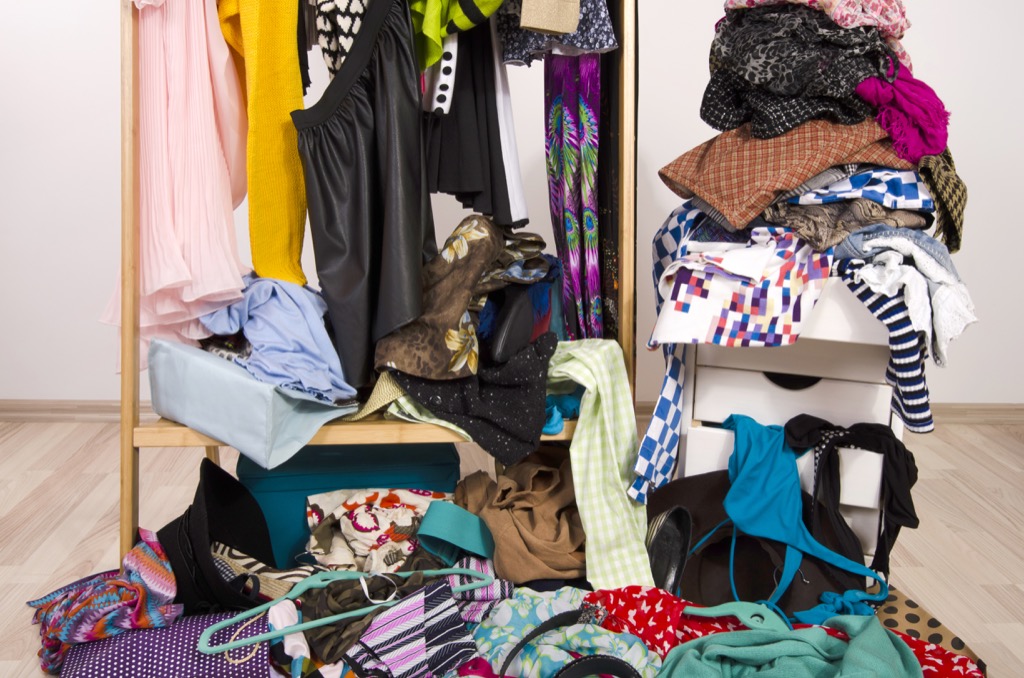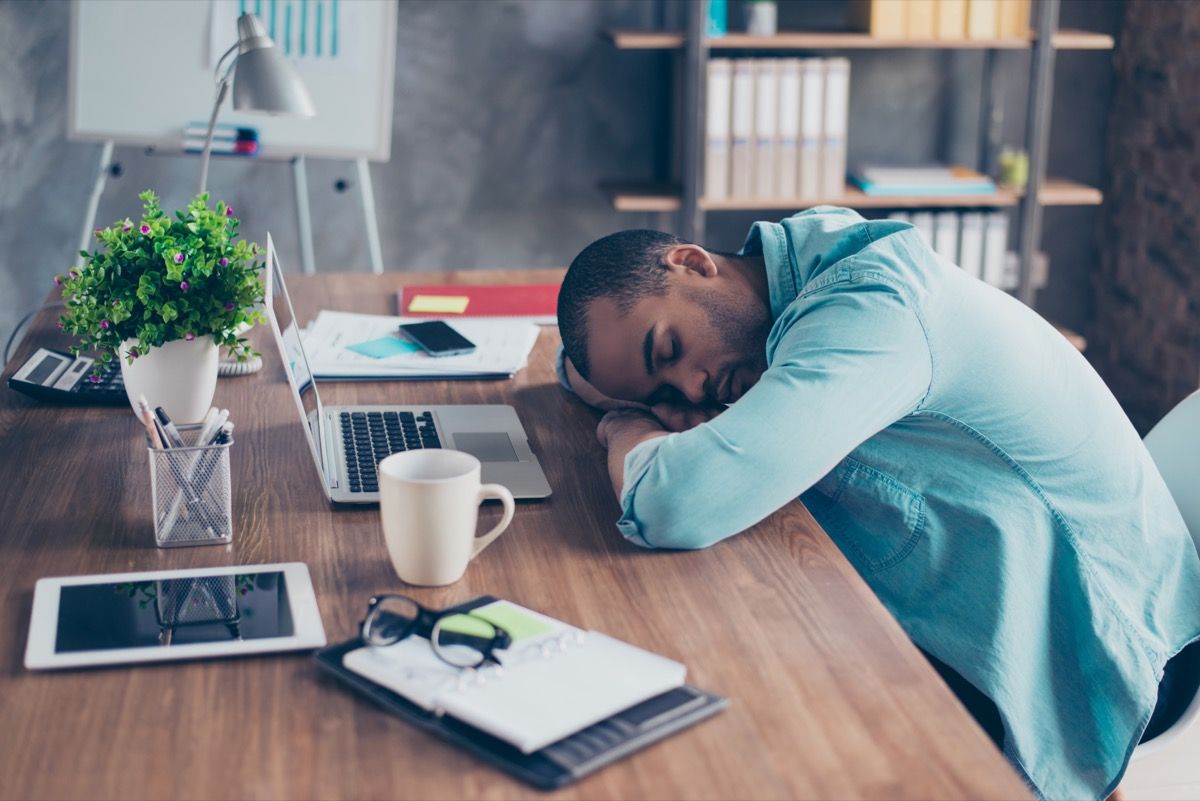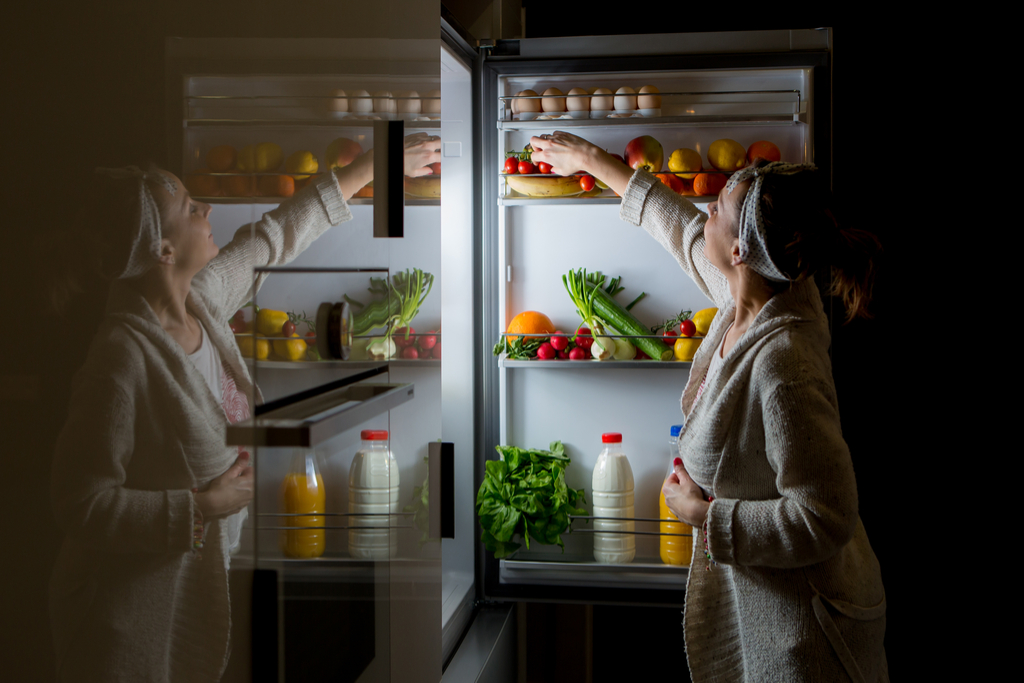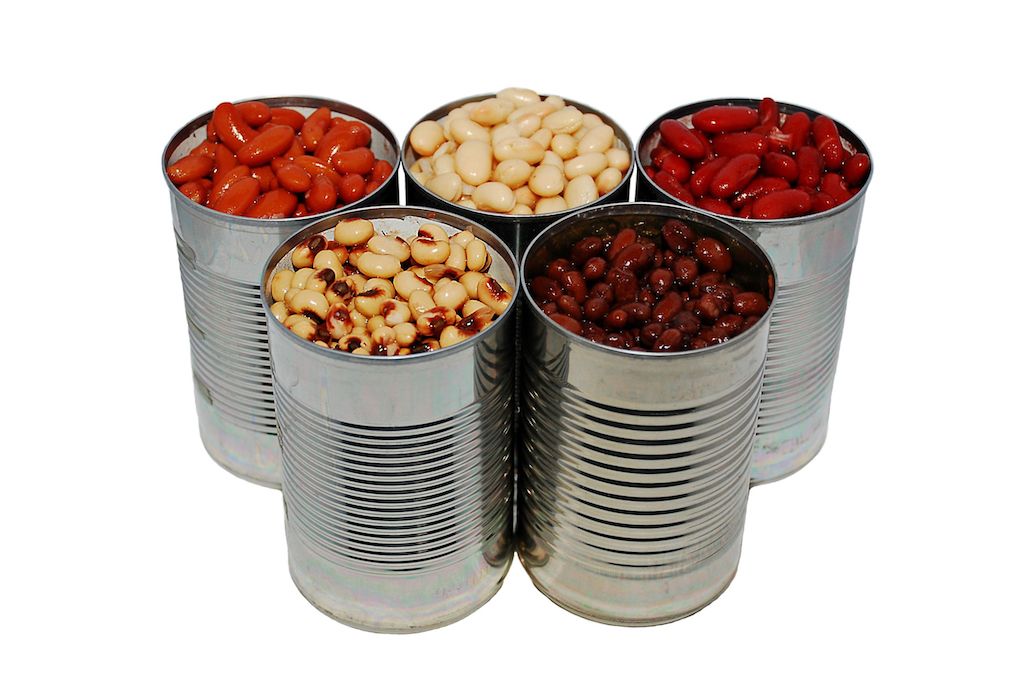There was something so simple about having one bar of soap for all your cleansing needs in your 20s. But the one-soap-fits-all approach to hygiene should definitely be upgraded once you hit 40… for many reasons. “Bar soap harbors bacteria by just sitting in the shower daily,” explains Bobbi Del Balzo, a medical aesthetician at Deep Blue Med Spa in New York. Plus, “soap bars imbalance your skin’s natural pH, causing dehydration,” and “when you wash with bar soap, it pulls the water out of your skin, offers little to no exfoliation, and causes dead dry skin to build up.” In short: Leave the bar behind for better skin and better health. And to see how your state stacks up against the rest of the country when it comes to wellness, check out Every U.S. State Ranked From Healthiest to Unhealthiest. Far too many people over 40 inflict damage on their ears in the misguided name of hygiene, says Dominique Malinowski, a hearing instrument specialist at Robillard Hearing Centres in Canada. They continue to use the much-maligned cotton swab to remove earwax, which, when done improperly, can cause damage to the eardrum, even potentially leading to hearing loss. However, this isn’t to say that you should live with clogged and dirty ears. “The best option would be to book an appointment with your doctor to remove the earwax, or even use an at-home ear wax removal aid,” says Malinowski. “Be grateful for every grey hair, every wrinkle, [and] every laugh line,” says Donna Matthezing, RN, founder of Compassionate Care in the Air. While it’s easy to treat these things as signs of your mortality, they’re also evidence of the great times you’ve been fortunate enough to experience. One 2018 study published in the journal PLOS One even found that adults who viewed aging positively were nearly 50 percent less likely to develop dementia in their lifetime than those who saw getting older as a negative. And to make sure you are around for years to come, check out 50 Important Habits Linked to a Longer Life. In your 40s, it’s time to stop putting up with toxic people. One 2010 study published in the journal Proceedings of the Royal Society found that only need one negative friend or family member can double your chances of being unhappy. While no one is urging you to excommunicate family and loved ones, if people in your life are unpleasant to be around, Matthezing recommends instituting barriers and limiting the time you spend together. Invoking Eleanor Roosevelt, Matthezing says: “Comparison is the thief of all joy.” If you focus on the fact that your journey is your own, the results can be tremendously freeing. “When we can get honest and truthful about how we are limited by our own ideas of what a 40-plus-year-old should look like, we can commit to how we want to look and feel for ourselves, not someone else’s version of us,” Matthezing explains. Caring for your ear canals is crucial as you get older, and one important change to make in your 40s is to use earplugs when you’re somewhere loud like a concert, says Malinowski.ae0fcc31ae342fd3a1346ebb1f342fcb If you do begin experiencing hearing loss regardless, Malinowski recommends seeing an audiologist immediately “to ensure there are no underlying issues.” And for ways you can tell you may have a medical issue, check out 40 Subtle Signs Your Body Is Telling You Something’s Seriously Wrong. When you’re younger, forgetting to say “thank you” is immature. But as a 40-something, it’s not only about manners; it’s also affecting your health. A 2013 study published in the journal Personality and Individual Differences concluded that verbal gratitude had a major psychological impact, particularly in older adults. By the time you reach 40, you can no longer leave negative debilitating thoughts to fester if you want to avoid harming your health. As one 2019 study from the American Heart Association notes, holding on to pent-up anger can lead to the development of chronic illnesses like heart disease. Just because flossing makes the most headlines doesn’t mean it’s the only part of your dental hygiene routine you should be thinking about. “If you want an amazing smile when you enter your golden years, I recommend following my four-step smile workout: brush, floss, rinse your mouth with an antibacterial mouth rinse, and clean the tongue,” explains Catrise Austin, DDS, founder of VIP Smiles in Flint, Michigan. Of course, you can’t do it all on your own. “Don’t forget to see your dentist every six months!” she adds. “Many people over the age of 40 have some unhealthy foot hygiene habits,” says Bruce Pinker, DPM, a foot and ankle surgeon at Progressive Foot Care in New York City. The most common, he says, is failing to dry between the toes after bathing. “If moist feet are placed inside closed shoes, the feet may become warm and fungus growth may be promoted, due to the wetness and the footwear, which prevents breathability,” Pinker explains. This can lead to blistering and cellulitis, as well as athlete’s foot. “By simply drying between the toes after bathing, one can help reduce the occurrence of such infections and therefore reduce foot discomfort,” he says. In addition, Pinker recommends using over-the-counter powders, which can be placed directly onto your feet or into socks to reduce wetness. And for more helpful information, sign up for our daily newsletter. Weight and resistance training is a must after 40. That’s because these types of workouts help to fortify health factors that tend to suffer with age, such as bone density, hormone levels, metabolism, and cognitive function, explains Tafiq Akhir, a certified personal trainer and owner of Tafiq’s Physiques in West Hollywood, California. Of course, if you’re lifting weights for the first time, just make sure to start with a coach or somebody with experience to ensure you don’t injure yourself. And you know what they say? “Sitting is the new smoking.” According to Monica Lam-Feist, a certified personal trainer and lead fitness expert at AlgaeCal, “sitting can increase your risk of obesity, type 2 diabetes, and even heart disease.” She urges the over-40 set to “get into the healthy habit of reminding yourself to get up and go for a quick walk or stand up [and] stretch when you’ve been sitting too long.” One 2019 study published in the Journal of the American Heart Association found that binge-watching is associated with an increased heart disease risk. And if you’re ready to cut back on your television consumption, Kyle Varner, MD, a physician specializing in internal medicine has an extreme, but simple way to resist the temptation: Get rid of the screen altogether. “I do not own a television and I recommend that anyone with one rid themselves of this pernicious device,” he says. “It is a waste of time and life.” Have you ever worn ill-fitting skinny jeans simply because you thought they were slimming? Well, it might be time to toss them now that you’re 40. As Octavio Bessa Jr., MD, noted in a 1993 paper published in JAMA Internal Medicine, this article of clothing can cause abdominal pain, bloating, and even heart palpitations. It’s such a common phenomenon, in fact, that it even has a name: tight pants syndrome. Just because you need a job doesn’t mean you need the job you have. By now you have enough experience to recognize what a good working situation is—and if you don’t have it, find it! Leaving a job that makes you unhappy not only boosts your mental health, but your physical wellbeing, too. According to a 2014 study published in the journal Psychosomatic Medicine, people with high job strain are at a higher risk of developing type 2 diabetes. By the time you’re in your 40s, you should ideally have reached a point in your career where you don’t have to over-exert yourself and put in extra hours. And if for some reason you still find yourself getting home at 10 p.m. every night, you may want to make some changes before your health starts to suffer. A 2016 study from the Melbourne Institute found that for workers over 40, workweeks longer than 25 hours had a negative impact on cognition.
Not only should you be taking better care of your belongings in your 40s, but leaving your clothes strewn across your bedroom might be sabotaging your sleep cycle as well. “It is a terrible habit to make your bedroom a storage area when it should be a sleep sanctuary,” says Bill Fish, a certified sleep science coach and co-founder of Tuck.com, a resource on the science of sleep. “Our minds tend to race with clutter, and having piles of things in our room is counterintuitive to rest.” You’ve likely heard it before, but it’s worth repeating: Looking at screens at night is unhealthy, especially in bed. “Looking at our phones before we go to bed is terrible for our sleep,” Fish says. That’s because of both the light from the screen itself and the activities we tend to do on our phones or tablets. “Not only are the blue lights emitting from screens bad for our sleep process [because they stop] our bodies from producing melatonin naturally, but checking emails before bed doesn’t exactly elicit relaxation,” he notes. You might’ve been able to get by on five hours of sleep in your 20s and 30s, but that’s not going to fly in your 40s. “During sleep, your brain sends a signal to your body telling it to release hormones and compounds that assist with decreasing your risk for health conditions, retaining your memory, managing your hunger levels, and maintaining your immune system,” explains John Gilmer, PhD, a professor of pharmaceutical chemistry at Trinity College Dublin. In addition, “sleep is also the period when our muscles rebuild and repair themselves in addition to getting larger and stronger.” Need he say more? Your kids aren’t the only ones who should have a routine bedtime. In a 2018 study of nearly 2,000 adults published in the journal Scientific Reports, researchers found that people with irregular sleep patterns who went to bed and woke up at different times every day weighed more and had higher blood sugar, higher blood pressure, and greater heart attack and stroke risks than those who had a consistent routine. If you’ve been relying on sleeping pills just to get a good night’s rest for the past 39 years, now might be the time to stop. According to research presented at the Alzheimer’s Association International Conference 2019, older adults who used sleep meditations “often” or “almost always” were 43 percent more likely to develop dementia over a 15-year period. “Many people over 40 get into the habit of coming home from work, having dinner, and then laying down to watch TV before finally turning in for the night,” says Gilmer. However, doings so doesn’t stimulate the brain like if you were to get out of the house and engage in a hobby, which “has been linked to positive mental health and a longer life expectancy,” he notes. So, don’t be afraid to try something new in your 40s and beyond; it could be just what you need to keep your mind and memory in working order.
Once you reach your 40s, it’s time to put your personal relationships first. Not only will doing so improve your home life, but it will make you healthier, too. After all, a 2010 study published in the journal Health Communication found that loneliness and poor health go hand in hand. Carla Manly, PhD, a clinical psychologist and author of Joy From Fear, urges 40-somethings to “stop thinking that you’ll give your partner better TLC ’later’ or ‘when life slows down.’” And the same goes for children, she says. “Your kids will be gone before you know it. Give them your time and attention now.” So don’t wait to set up a dinner with your old college buddies or get a date night with your spouse on the calendar.
Especially in your 40s when you have numerous people to care for and responsibilities to worry about, it can be easy to put your health on the back burner. However, whether you’re feeling under the weather or are just overdue for a checkup, you should never deprioritize your well-being. As Manly notes, you need to “take your doctors’ visits, diet, and exercise seriously” in order to ensure that you live a long and healthy life.
Once you turn 40, you need to be extra diligent about wearing sunscreen whenever you go outside—and not just in the summertime. What’s more, Gilmer says you should never use sunscreen under SPF 30. Anything lower than that “can give you sunspots as well as speed up the aging process,” he notes. Using a sunscreen that’s too weak can also lead to increased wrinkles and, of course, make you more vulnerable to the sun’s skin cancer-causing rays.
Another unhealthy habit that you need to abandon once you turn 40? Heavy alcohol consumption. “Drinking alcohol causes the pores to dilate, contributing to breakouts and excess oil,” explains Del Balzo. “Alcohol also increases certain enzymes in the skin tissue, causing it to become dehydrated and dry.” And it should go without saying that alcohol can damage much more than just your skin. “Drinking several glasses of alcohol on a daily basis is not good for your long-term health and it doesn’t help your quality of sleep, either,” explains Akhir. Keep your boozy drinks to a minimum, and you’ll find that you look and feel much younger than you actually are. Unlike apples, it turns out one glass of wine a day may not keep the doctor away. “While it’s easy to look to wine or a cocktail to relieve daily stress, the jury is still out on whether the pros outweigh the cons, even with one glass,” says Akhir. The occasional nightcap is not going to set you back massively, but don’t make a habit of throwing back a glass of wine before bed every single night. Though this isn’t a big problem during the pandemic, restaurants will eventually be open—and when they do, it’s best that you patronize them in moderation. As Gilmer points out, “restaurant food is full of fat and salt.” So it’s best to keep eating out to a minimum, for both the health of your body and your bank account. We all know snacking before bed affects your waistline, but it can cause problems for your complexion as well. “When you eat late at night, your body doesn’t have time to metabolize the food and it disrupts an important enzyme that plays a key role in skin repair,” explains Del Balzo. To ensure smooth and wrinkle-free skin all through your 40s and beyond, make sure to avoid munching a good three to four hours before hitting the hay.
“Yo-yo dieting not only damages your metabolism, [but] it can also lead to nutritional deficiencies, hair loss, digestive issues, fatigue, and memory loss,” warns Akhir. If you want to lose weight without doing damage to your body, he suggests finding a balanced program that works for you and sticking to it. “Not only will it help you look better, but you’ll improve your overall health and wellness as well.” Sure, a younger you may have have been able to rush out the door with only a cup of coffee in your stomach, but 40-year-old you should take the time to eat a balanced breakfast before heading out for the day. “By avoiding breakfast, you cause blood sugar fluctuations that can negatively affect your energy,” Akhir explains. And the consequences don’t end there. “People who skip breakfast also tend to overeat and choose unhealthy food options later in the day,” he says.
Every time you consume fast food, your body almost certainly lets you know it isn’t happy—you just need to listen. “You can pretend your body isn’t affected for only so long,” says Bess Berger, registered dietitian and founder of ABC Nutrition By Bess in Teaneck, New Jersey. You don’t have to go cold turkey, though. “Think about how many times you eat fast food a week, then come up with a reasonable number to cut it down to,” she suggests. “Then, cut it down again and again.” Now that you’ve over 40, you shouldn’t have to use canned food as a cooking crutch. And by eliminating those canned foods from your diet, you’ll avoid exposure to BPA—an ingredient used in aluminum can linings—which has been shown to disrupt thyroid function, says Leonardo Trasande, MD, a professor at the NYU School of Medicine. Of course, the notion that sugar and processed carbs are bad for you is hardly anything new. But Varner, a physician specializing in internal medicine, warns that their effects are even more dire than you might’ve realized. In addition to causing weight gain, eating too much sugar and processed carbs can “greatly increase” one’s chances of developing type 2 diabetes later in life. Not only that, but Varner warns that “there is some evidence that it could be linked to Alzheimer’s disease.” After 40, mindlessly snacking on packaged, processed foods should be a thing of the past. However, having kids can make this difficult. Instead of keeping tasty snacks in brightly colored packaging lying around, reduce their allure by storing them in hard-to-reach places, which will benefit both you and your little ones. Out of sight, out of mind. Despite what social media and mass marketing may have you believing, vaping isn’t actually safer than using other tobacco products. They are all bad for you. In fact, research presented by the American College of Cardiology in 2019 found that adults who vaped were 56 percent more likely to have a heart attack and 30 percent more likely to suffer a stroke than those who didn’t use any tobacco products. Smoking is never a good idea—but by the time you’re in your 40s especially, it’s high time to do away with this bad habit. A handful of vitamins no longer counts as a substitute for broccoli in your 40s. The fact of the matter is that essential nutrients react within the body differently depending on how they are consumed. One 2006 study published in the journal Clinical Interventions in Aging even found that supplementing essential nutrients with vitamins was associated with a higher risk of stroke and cardiovascular disease.
“Nearly 75 percent of adults in the U.S. walk around in a chronic state of dehydration,” says Wayne Anthony, a clean water advocate and founder of WaterFilterdata.org. “This leads to fatigue, irritability, lack of productivity, brain fog, elevated heart, muscle damage… you name it.” In addition to consuming more H2O, Anthony also recommends cutting back on dehydrating liquids. Specifically for the over-40 set, he urges decreasing alcohol and caffeine consumption. “Replace such beverages with water—even sparkling water if you need something different.”
According to the Centers for Disease Control and Prevention (CDC), nearly 90 percent of Americans consume more than the recommended amount of salt. “Recommendations are for no more than 2,300 milligrams of salt per day,” explains Garth Graham, MD, a practicing cardiologist in Kansas City, Missouri. Most of the salt you eat comes from packaged and processed foods—so while you don’t need to get rid of your salt shaker entirely, it’s important to be aware of the sodium content in everything you’re buying at the grocery store.
Of the 7,000 waking hours you have each year, very few of them are spent in the doctor’s office. So, it’s really the people you spend the most time with who influence your health for better or for worse. “Your boss, your teacher, your local elected official, even your neighbors have the potential to influence your health more than your doctor,” says Graham. “Social determinants of health are adding and detracting from your health every day.” So to remain in tip-top shape, it’s crucial to surround yourself with the right people.






